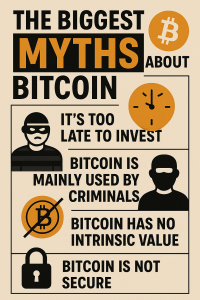
The Biggest Myths People Still Believe About Bitcoin
Even after more than a decade, Bitcoin continues to be one of the most talked-about — and misunderstood — innovations in finance. For every believer who sees it as the future of money, there’s a sceptic dismissing it as a bubble or a fad. Somewhere in between lies the truth: Bitcoin isn’t perfect, but it’s far from a passing trend.
Much of the confusion comes from lingering myths — half-truths that keep circulating even as new information debunks them. Whether you follow financial blogs or regular crypto news analysis, you’ve likely come across some of these misconceptions yourself. Let’s separate fact from fiction and unpack the biggest myths people still believe about Bitcoin.
1. “Bitcoin Has No Real Value”
One of the most common claims about Bitcoin is that it’s “just made up” — that because it’s digital, it can’t have value. But this misunderstands what gives any asset its worth.
Value isn’t determined by physical substance — it’s determined by trust and utility. Traditional currencies aren’t backed by gold anymore; they’re backed by belief in the system that issues them. Similarly, Bitcoin derives its value from scarcity (there will only ever be 21 million coins), security (its blockchain is nearly impossible to tamper with), and usability (it can be sent globally without banks or borders).
Just like gold or art, Bitcoin’s value exists because people agree it has value — and because it serves a purpose that’s increasingly useful in the digital economy.
2. “It’s Only Used by Criminals”
Yes, Bitcoin was once associated with dark web markets — but that was over a decade ago. Today, the vast majority of Bitcoin activity is legitimate and traceable. In fact, blockchain transparency makes it easier to follow the flow of funds than with traditional cash.
Government agencies and forensic firms can track transactions across public ledgers, making illegal activity far riskier than before. Meanwhile, institutions like banks, corporations, and even governments are exploring blockchain-based systems for transparency and efficiency.
The idea that Bitcoin is primarily for criminals is not only outdated — it ignores how mainstream adoption has transformed its role in global finance.
3. “Bitcoin Is Bad for the Environment”
This one’s partly rooted in truth but often exaggerated. Bitcoin mining does consume significant energy, but the conversation is more complex than it appears.
Many mining operations are now powered by renewable energy or use excess electricity that would otherwise go to waste. Additionally, Bitcoin’s energy use is transparent and measurable — unlike the global banking system, which consumes far more resources across physical infrastructure, data centres, and transport.
The industry is evolving fast, with innovations in energy efficiency and sustainability. The real debate isn’t whether Bitcoin uses energy — it’s whether the value it provides justifies that use.
And for millions around the world without access to stable financial systems, it arguably does.
4. “Bitcoin Is Too Volatile to Be Taken Seriously”
Volatility is undeniable — Bitcoin prices can swing dramatically in short periods. But every emerging asset class goes through this phase. Stocks, oil, and even gold all experienced extreme fluctuations early in their histories.
Bitcoin’s price volatility is a symptom of growth, not failure. As adoption widens and more institutional investors hold it long-term, volatility tends to decrease.
More importantly, short-term price movement doesn’t define long-term value. Many investors see Bitcoin as “digital gold” — a hedge against inflation and currency debasement, not a quick profit tool.
5. “It’s Too Late to Get In”
If you’ve ever heard someone say, “I wish I bought Bitcoin in 2012,” you’re not alone. But thinking it’s too late misses the bigger picture.
Bitcoin’s story isn’t over — it’s just evolving. While early adopters benefited most from price growth, the technology itself continues to unlock new opportunities. Beyond Bitcoin, the entire blockchain ecosystem (from smart contracts to decentralised finance) is still in its infancy.
Think of Bitcoin not as a missed opportunity, but as a foundation for the next phase of digital innovation. Just as the internet created thousands of new industries, blockchain is likely to do the same.
6. “Bitcoin Will Be Replaced by Something Better”
Many new cryptocurrencies claim to be “the next Bitcoin.” But Bitcoin’s first-mover advantage, network security, and decentralisation make it unique. It’s not just another digital coin — it’s a protocol, a store of value, and a cultural movement rolled into one.
While other blockchains serve different purposes — such as smart contracts or decentralised apps — none have replicated Bitcoin’s combination of simplicity, reliability, and global trust. Like gold in the financial world, Bitcoin’s role as digital money isn’t easily replaced.
7. “It’s Too Complicated for Regular People”
Admittedly, Bitcoin’s technical side — wallets, keys, mining — can sound intimidating. But you don’t need to be a developer to participate.
Just as most internet users don’t understand TCP/IP or DNS, you don’t need to grasp blockchain code to use Bitcoin safely. Modern exchanges, apps, and wallets have made it as simple as online banking. Education is key — and thankfully, it’s easier than ever to find accessible guides and tutorials.
Bitcoin isn’t without risks or challenges, but most myths stem from misunderstanding rather than reality. As with any major innovation, scepticism fades as awareness grows.
By learning from credible sources, questioning assumptions, and seeking balanced crypto news analysis, investors and everyday readers alike can make sense of where Bitcoin truly fits in our financial future.
It’s not magic money or a get-rich scheme — it’s a technology redefining how we think about trust, ownership, and value in the digital age.
